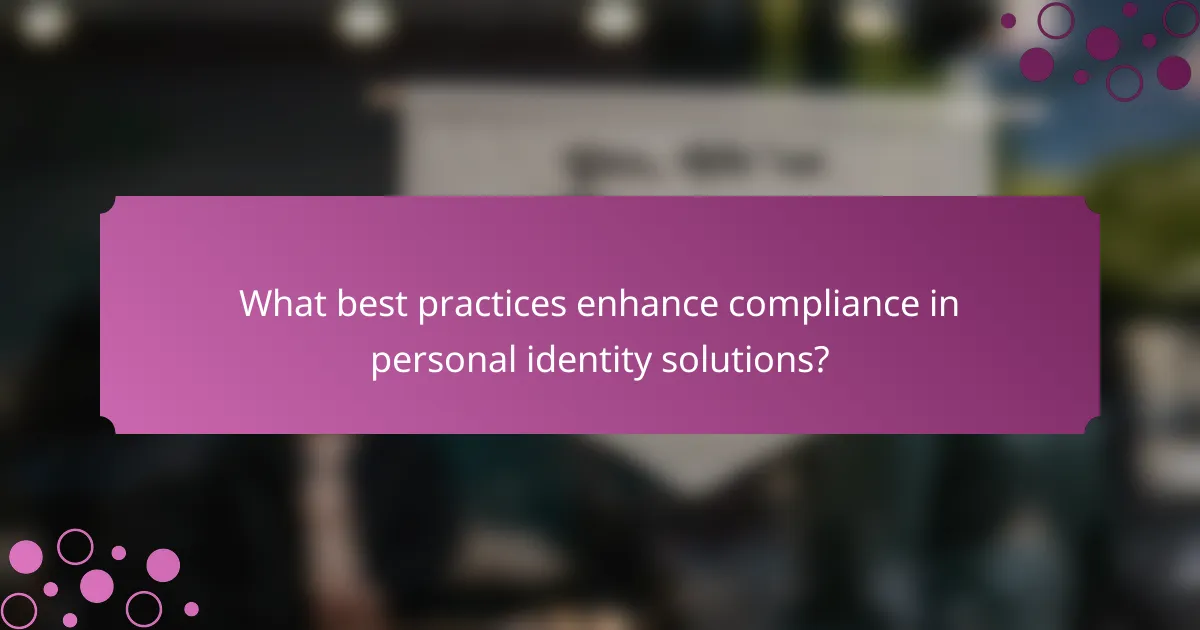In the UK financial sector, compliance navigation solutions for personal identity are crucial for meeting regulatory requirements while ensuring secure identity management. By implementing robust measures and leveraging advanced technologies, financial institutions can effectively tackle identity challenges and mitigate risks related to identity fraud. Adopting best practices such as regular audits and employee training further enhances compliance and strengthens customer trust.

What are the compliance navigation solutions for personal identity in the UK financial sector?
Compliance navigation solutions for personal identity in the UK financial sector include various services and technologies that help organizations meet regulatory requirements while ensuring secure and efficient identity management. These solutions are essential for mitigating risks associated with identity fraud and maintaining customer trust.
Identity verification services
Identity verification services are crucial for financial institutions to confirm the identities of their clients. These services typically involve checking government-issued identification, biometric data, and other personal information against reliable databases. Many providers offer real-time verification, which can significantly reduce onboarding times and enhance customer experience.
When selecting an identity verification service, consider factors such as accuracy rates, integration capabilities with existing systems, and compliance with the UK’s Anti-Money Laundering (AML) regulations. Look for solutions that support multiple verification methods to cater to diverse customer needs.
Regulatory technology platforms
Regulatory technology (RegTech) platforms streamline compliance processes by automating tasks related to personal identity management. These platforms can help financial institutions track regulatory changes, manage documentation, and ensure adherence to standards like the General Data Protection Regulation (GDPR) in the UK.
Choosing the right RegTech solution involves assessing its scalability, user-friendliness, and ability to integrate with other compliance tools. A good platform should provide real-time updates on regulatory changes and offer analytics to identify potential compliance risks.
Data protection consulting
Data protection consulting services assist financial organizations in developing robust strategies to safeguard personal identity information. These consultants evaluate existing data management practices, identify vulnerabilities, and recommend improvements to comply with data protection laws.
Engaging a data protection consultant can help ensure that your organization implements best practices for data handling, such as data minimization and encryption. Regular audits and training sessions can also enhance staff awareness and compliance with data protection regulations, reducing the risk of breaches and fines.

How do financial institutions address personal identity challenges?
Financial institutions tackle personal identity challenges by implementing robust compliance measures and leveraging advanced technologies. These strategies help mitigate risks associated with identity fraud and ensure adherence to regulatory requirements.
Implementing KYC procedures
Know Your Customer (KYC) procedures are essential for financial institutions to verify the identities of their clients. This process typically involves collecting and analyzing customer information, such as identification documents and financial history, to assess risk levels.
Institutions often use a tiered approach to KYC, where the depth of verification corresponds to the risk profile of the customer. For example, high-risk clients may undergo more rigorous checks, including enhanced due diligence, while low-risk customers may only need basic identification verification.
Common pitfalls include inadequate documentation and failure to update customer information regularly. Institutions should establish a routine review process to ensure compliance with evolving regulations and maintain accurate records.
Utilizing biometric authentication
Biometric authentication enhances security by using unique physical characteristics, such as fingerprints or facial recognition, to verify identities. This technology provides a more secure alternative to traditional passwords and PINs, which can be easily compromised.
Financial institutions can implement biometric systems at various customer touchpoints, including mobile banking apps and ATMs. For instance, a bank might allow customers to access their accounts using facial recognition technology, streamlining the login process while increasing security.
However, institutions must consider privacy concerns and ensure compliance with data protection regulations when implementing biometric solutions. Clear communication about data usage and obtaining customer consent are critical steps in this process.

What best practices enhance compliance in personal identity solutions?
Best practices that enhance compliance in personal identity solutions include regular audits and employee training programs. These strategies help organizations navigate regulatory requirements and mitigate risks associated with identity verification processes.
Regular audits and assessments
Conducting regular audits and assessments is crucial for maintaining compliance in personal identity solutions. These evaluations should focus on identifying gaps in processes, ensuring adherence to regulations, and verifying the effectiveness of existing controls.
Organizations should schedule audits at least annually, but more frequent assessments may be necessary depending on the complexity of operations and changes in regulatory landscapes. Utilizing third-party auditors can provide an objective perspective and highlight areas for improvement.
Employee training programs
Implementing comprehensive employee training programs is essential for ensuring compliance in personal identity solutions. These programs should educate staff on relevant regulations, company policies, and best practices for identity verification.
Training sessions should be conducted regularly, ideally at onboarding and then annually or biannually. Incorporating real-life scenarios and role-playing can enhance understanding and retention, helping employees recognize potential compliance issues before they arise.

What are the key regulations affecting personal identity solutions in the UK?
The key regulations affecting personal identity solutions in the UK include the UK General Data Protection Regulation (UK GDPR) and guidelines set by the Financial Conduct Authority (FCA). These regulations ensure that personal data is handled securely and that financial institutions maintain high standards of compliance in their identity verification processes.
UK GDPR compliance
UK GDPR compliance is crucial for any organization handling personal data. It mandates that businesses obtain explicit consent from individuals before processing their data and ensures that data is stored securely and used only for specified purposes. Non-compliance can lead to significant fines, often reaching up to 4% of annual global turnover or £17.5 million, whichever is higher.
Organizations must implement data protection measures, such as data minimization and encryption, to safeguard personal information. Regular audits and staff training on data handling practices can help maintain compliance and mitigate risks associated with data breaches.
FCA guidelines
The Financial Conduct Authority (FCA) provides specific guidelines for identity verification in the financial sector, emphasizing the need for robust Know Your Customer (KYC) processes. These guidelines require firms to verify the identity of their clients to prevent fraud and money laundering, which is critical for maintaining trust in the financial system.
Firms should adopt a risk-based approach when implementing identity solutions, adjusting their verification processes according to the level of risk associated with different customer profiles. This may involve using a combination of document verification, biometric checks, and third-party data sources to ensure comprehensive identity verification.

How can financial institutions choose the right identity verification provider?
Financial institutions can choose the right identity verification provider by assessing their technology capabilities, compliance with regulations, and customer support services. A thorough evaluation ensures that the provider meets the institution’s specific needs while adhering to industry standards.
Evaluating technology integration
When evaluating technology integration, consider how well the identity verification provider’s systems can interface with your existing platforms. Look for solutions that offer APIs or SDKs for seamless connectivity, which can reduce implementation time and costs.
Additionally, assess the provider’s ability to support various verification methods, such as biometric authentication or document verification. This flexibility can enhance user experience and improve security, catering to diverse customer needs.
Assessing customer support services
Customer support is crucial in the identity verification process, as issues may arise that require immediate attention. Evaluate the provider’s support channels, such as phone, email, or live chat, and their availability during business hours.
Consider the responsiveness and expertise of the support team. A provider that offers dedicated account management or technical support can help resolve challenges quickly, ensuring minimal disruption to your operations.

What emerging trends are shaping personal identity solutions in finance?
Emerging trends in personal identity solutions for the financial sector focus on enhancing security, improving user experience, and ensuring compliance with regulations. Key developments include AI-driven identity verification and decentralized identity models, which address challenges in fraud prevention and data privacy.
AI-driven identity verification
AI-driven identity verification utilizes machine learning algorithms to analyze user data and authenticate identities quickly and accurately. This technology can process vast amounts of information, such as biometric data, documents, and behavioral patterns, to assess risk and confirm identities in real-time.
Financial institutions adopting AI-driven solutions can reduce fraud rates significantly, often achieving improvements in verification times to just a few seconds. However, they must ensure compliance with regulations like the General Data Protection Regulation (GDPR) in Europe, which governs data usage and privacy.
Decentralized identity models
Decentralized identity models empower users by allowing them to control their own identity data without relying on a central authority. This approach leverages blockchain technology to create secure, verifiable credentials that can be shared selectively with financial institutions.
These models enhance privacy and reduce the risk of data breaches, as sensitive information is not stored centrally. Financial organizations considering this approach should evaluate the trade-offs, such as the need for user education and the potential for slower adoption rates among less tech-savvy clients.

What future developments can we expect in personal identity compliance?
Future developments in personal identity compliance will likely focus on enhanced regulatory frameworks, advanced technology integration, and improved user experience. Organizations must stay ahead of evolving regulations and leverage technology to streamline compliance processes.
Emerging technologies in identity verification
Emerging technologies such as biometrics, artificial intelligence, and blockchain are reshaping identity verification. Biometrics, including facial recognition and fingerprint scanning, offer secure and user-friendly methods for confirming identity. AI can analyze vast amounts of data to detect fraudulent activities, while blockchain provides a decentralized and tamper-proof way to store identity information.
Regulatory changes impacting the financial sector
Regulatory changes, such as the General Data Protection Regulation (GDPR) in Europe and the Anti-Money Laundering (AML) directives globally, are significantly impacting the financial sector. These regulations require institutions to enhance their identity verification processes and ensure data protection. Compliance with these evolving standards is crucial to avoid hefty fines and reputational damage.
Best practices for compliance management
Implementing best practices for compliance management involves creating a robust identity verification framework. Organizations should regularly update their compliance policies to reflect current regulations and invest in training for staff. Utilizing automated tools can streamline compliance processes, reduce human error, and improve efficiency.
Additionally, maintaining clear communication with regulatory bodies and staying informed about industry trends is essential. Regular audits and assessments can help identify gaps in compliance and ensure that organizations remain aligned with legal requirements.


